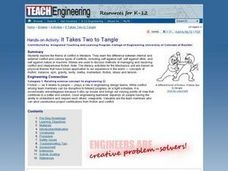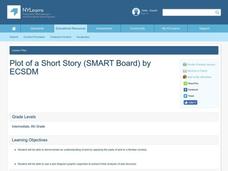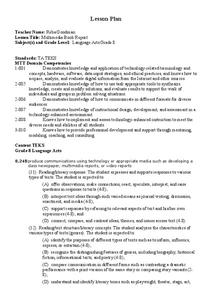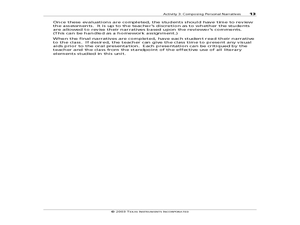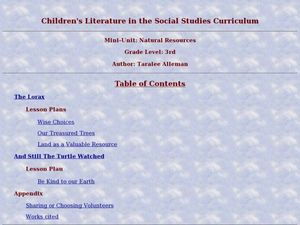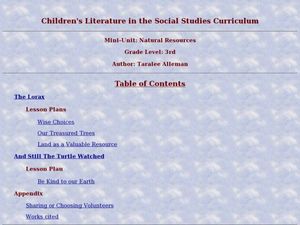Curated OER
Human Rights in the News
Students, in groups, review recent newspapers and news media. They construct a poster using items from the newspaper grouped under four categories: rights being practiced or enjoyed, rights being denied, rights being protected, and...
Curated OER
Themes in "Romeo and Juliet"
Students read the play, Romeo and Juliet, and discuss the main themes. They examine the music they listen to, and present selections that reflect any of the themes in the play.
Curated OER
Fishing for Success
Students listen to story Rainbow Fish to the Rescue, and identify strategies to assist those in need.
Curated OER
Literature and History of the Holocaust
Young scholars examine quotes and text passages related to the Holocaust. They generate a list of questions about the Holocaust and analyze a piece of writing based on the authorship of the work. They infer the meaning of a poem and...
Curated OER
It Takes Two To Tangle
Students utilize strategies to comprehend literature. They write stories with diverse vocablulary that incorporate the difference between internal and external conflict. They make sure that the stories use methods of managing and...
Curated OER
Keepers
What are some things you think are special enough to keep? Discussing special things launches young learners into reading Keepers. They investigate related vocabulary and practice before, during, and after reading comprehension...
Curated OER
Plot of a Short Story (SMART Board)
Using the SMART Board, teacher reviews the elements of a short story while students follow along in their notebook. Continuing with the SMART Board, teacher introduces the definition of plot and the five parts as students take notes....
Curated OER
Help Me Learn About the Holocaust
Young readers select a book from a provided list to use as the basis for an intensive class study of Holocaust novels. After completing their novels, groups create a multimedia presentation highlighting the elements of literature...
Curated OER
Plot of a Short Story (SMART Board)
Help your pupils track the plot of a short story with this SMART Board activity. Using the short story "The Dinner Party" by Mona Gardner (though the lesson would work with any other short story), they define the exposition, rising...
Curated OER
Know Yourself
Eleventh graders explore the events of the Holocaust. In this cross curriculum lesson, 11th graders examine the differences between prejudice and discrimination. Students read various forms of literature and write journal entries.
Curated OER
Comparing Two Poe Classics
Young scholars read and discuss The Black Cat and The Tell-Tale Heart. In this poetry lesson, students construct a Venn diagram to compare and contrast two pieces of literature.
Curated OER
Shakespeare 2000
Comparing the more modern film Ten Things I Hate About You to The Taming of the Shrew leads to an understanding of how Shakespearean plots can be applied to modern-day situations and characters. As a culminating activity, groups select a...
Curated OER
Multimedia Book Report
Young readers plan and draft a book report focusing on the five key components of a novel: plot, character, setting, conflict, and theme. After completing a story board, pupils then prepare a PowerPoint book report that is shown to the...
Curated OER
Activity 3: Composing Personal Narratives
What was your most (exciting, maddening, nervous, thrilling, etc.) experience in school? A part of a unit on narrative writing, in this lesson class members review the elements of the form and then choose an event when they learned a...
Curated OER
Word Roots NAT, TRACT, and SEQ Advanced Crossword Puzzle
A challenging activity that builds vocabulary as it tests knowledge of the word roots NAT, TRACT, and SEQ. This 12-clue crossword puzzle requires pupils to generate words that appropriately match the clues provided as well as contain the...
Curated OER
Lesson Plan 2: So What's a Novel, Anyway?
What makes a novel a novel? Class members select a favorite novel, record their impressions on a worksheet, and then come together in groups to discuss the elements common to narrative writing. Next, they identify the characters, the...
Curated OER
Reporting on the 1920s
Use this roaring 1920s history lesson to have young writers research primary and secondary sources. They use their research to examine the events or famous public figures of the time period. Next, they imagine they're in the 1920s and...
Curated OER
Pioneering Children on the Move
Students inquire about life for pioneer children. For this pioneer period lesson, students analyze photographs of children, make information foldables, and create a covered wagon that was typical of the ones of the past. Students will...
Curated OER
Sticks, Stones, Sinews and Stuff: How Early People Used the Environment to Meet Basic Needs
Students create an artifact. In this early survival activity, students use found objects to create an artifact that could have been used to help early people meet their basic needs.
Curated OER
Travels With Charley
Fifth graders engage in a literature study that uses a variety of texts in order to maximize their exposure to different reading situations. They examine each book in order to practice skills of reading comprehension. They recognize the...
Curated OER
Our Treasured Trees
Students discuss natural resources and renewable resources with trees being considered renewable resources which need special attention. In this Earth science lesson, students write a list of reasons for why it would be good to stop...
Curated OER
And Still The Turtle Watched
Third graders discuss ways to be kind to the Earth. In this conservation lesson, 3rd graders listen to the story And Still The Turtle Watched by Sheila MacGill-Callalhan. They compare how the early people treated the Earth to how we...
Curated OER
Be Kind to our Earth
Students make a list of ideas on ways we can take care of our Earth and complete a class project planning sheet where they problem solve to help save the Earth. In this Earth lesson plan, students also play a conservation charades game.
Florida Center for Reading Research
Comprehension: Narrative Text Structure, Story Pieces
An activity boosts reading comprehension by challenging scholars to answer questions about a narrative tale detailing elements—plot, characters, setting, theme, problem, and solution.






